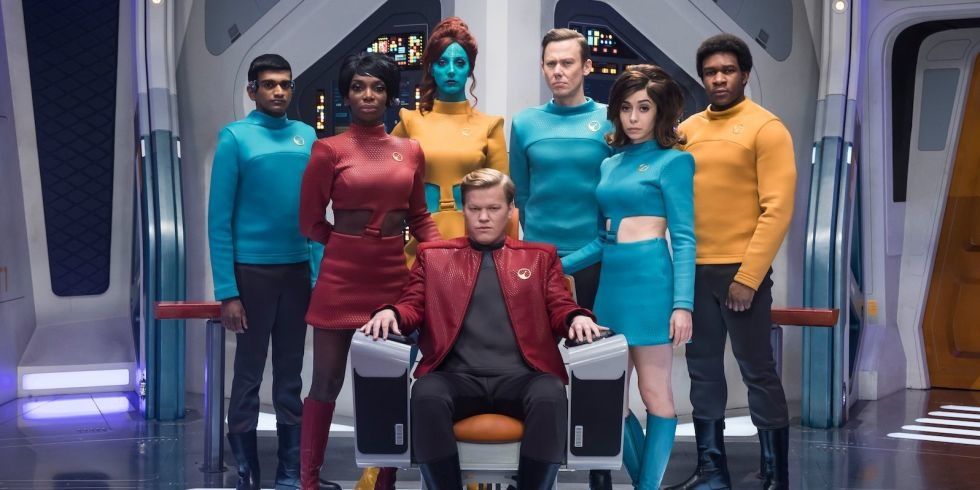Advertisment Feature
SATURDAY FILM SCHOOL | Season Four of ‘Black Mirror’ is One Big Parable
06 Jan, 18
The key theme here is autonomy, the ability to self-govern and control the realities and conditions of your world and physicality, which is something virtual bodies lack.
There’s Itfor people who enjoy the visceral stimulation of fear itself, and Saw for people who love gruesome slasher films, and then there’s Netflix’s Black Mirror, the show you binge-watch when you want to see virtual reality, dating apps, video games, and surveillance technology mentally entrap and psychologically torment its users. There’s blood here, but the real terror isn’t watching a blonde babe run for her life in a mini dress; the scariest part of Black Mirror is the familiarity of the technology and our very human dependence on it. Black Mirror studies technology like an appendage to the human body: each episode introduces a new product, a new app, a new medical achievement intended to improve and enhance the human experience. You’ll make more friends, find your perfect soulmate, archive your memories on the cloud, and, if you’re lucky, you’ll survive to tell the story. Because in Black Mirror, technology offers a temporary solution to the parts of humanity that elude algorithmic fixes. In season four, control, autonomy, and surveillance are vital themes, precisely the lack of autonomy and control virtual bodies have in the afterlife. Charlie Booker‘s fourth season dedicates four episodes to explore virtual entrapment, the state of existing without power, and the corporations that commodify virtual consciousness.
Before you wonder how it all works, how one takes a human conscious and uploads it to the cloud, consider “San Junipero,” the Emmy award-winning episode that showed just how beautiful of a reality that could be, even as a virtual simulation. The episode is one of the most hopeful in the series’ catalog, but its to-be-continued counterpart, “Hang the DJ,” doesn’t hit the same notes. If anything, this episode is one of many, reiterating a pathos Black Mirror has already shown you: love can be a chemical reaction, or an arrangement made by a sterile algorithm; parenting can be a messy learning process, or an exercise in omniscient surveillance and coddling; memories can help build the narrative of your past self, or haunt the narrative of your present self. The key theme here is autonomy, the ability to self-govern and control the realities and conditions of your world and physicality, which is something virtual bodies lack. With news of sex robots in development, it looks like inanimate toys—whether virtual or robotic—will have their turn with indefinite servitude. But Black Mirror explores what this really looks like in the wrong hands, an object with human traits subject to the torture and co-dependency of its user. Human catharsis has never looked weirder.
For those of us that have a sticker covering the camera of our MacBooks, there’s a familiar sentiment you’ll find in this anthology series that mixesTwilight Zone‘s ethos with David Cronenberg‘s shock value. It’s the terrifying reality that our creations can ironically complicate and impinge our freedoms and nature as humans, but, like an after-school special, we get it. Certain tropes are recycled in this season (harvesting memories, implanting small, white devices into brains, and chronic paranoia), and the effect is like a numbing parable. “Arkangel” shares a similar moral dilemma with season one’s “The Entire History of You.” Then there’s the “Crocodile” episode where, again, memories are used in legal and interpersonal investigations. It seems most critics are taken with the first episode, “USS Callister,” a layered examination of a man who indulges fetishistic power play in a Star Trek–esque fantasyland by collecting DNA samples to create virtual copies of his co-workers. The writing is sharp, guiding the audience to sympathize with his awkward behavior only to reveal his toxic personality: an insecure man exploring control by stripping it from his virtual pals.
In most Black Mirror stories, the pathos revolves around a character’s inability to see how their worst proclivities are enabled by the technologies they abuse, and “USS Callister” delivers, offering a look into the joys and horror of escapism. There is something cathartic and pleasurable about ruling as an omniscient power, an anonymous god to the virtual worlds we create, but escapism alone cannot rectify the conditions of our realities. Season four succeeds because it still captures the humanity of it all, the blood pumping beneath the simulation and the humans that choose to find authenticity in coding and algorithms.
 ‘Black Mirror’Netflix
‘Black Mirror’Netflix
POP⚡ DUST Score: ⚡⚡⚡⚡
Shaun Harris is a poet, freelance writer, and editor published in avant-garde, feminist journals. Lover of warm-toned makeup palettes, psych-rock, and Hilton Als. Her work has allowed her to copyedit and curate content for various poetry organizations in the NYC area.
POP⚡ DUST | Read More About Film/TV…
BOX OFFICE BREAKDOWN | What’s coming to theaters this weekend?
REVIEW | “Seat in Shadows” Queer Cinema Done Right
THE REAL REEL | Sarah Silverman Loves America, But How Does America Feel?
SATURDAY FILM SCHOOL | “You’re tearing me apart Lisa!”
- Review: ‘Black Mirror’ Finds Terror, and Soul, in the Machine – The … ›
- Black Mirror review – Charlie Brooker’s splashy new series is still a … ›
- ‘Black Mirror’ Season 4 review: Sci-fi series has a little less bite ›
- Black Mirror review: the Netflix series is back – and darker than ever … ›
- Ranking ‘Black Mirror’ Season 4’s Episodes From Worst To Best ›
- Black Mirror Season 4: Trailer, episodes, cast and everything you … ›














